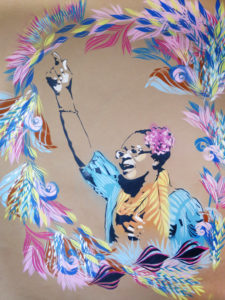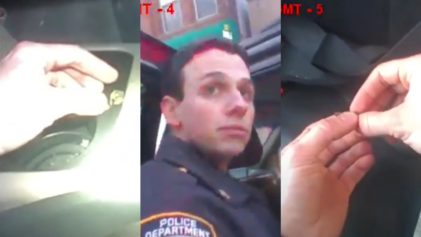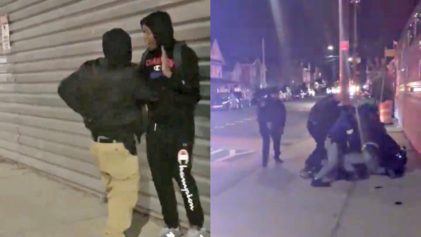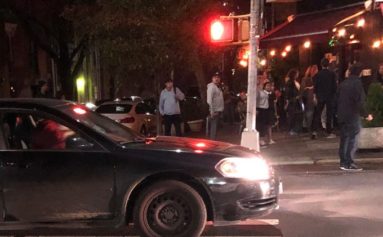This profile is part of an ongoing series of narratives focused on men and women who have been killed by the police. It is an attempt to counteract media bias, which often vilifies these men, women, boys and girls. These stories have been captured through the voices of the victims’ family members. I have been fortunate to meet the families through my activism in the Black Lives Matter movement and through work in various organizations.
“Growing up, my sister was my idol. If my sister got a whipping, I wanted to get a whipping too. If my sister ran away, I’m going to run away too. That’s how much I love my older sister, Sylvia,” Hertencia Peterson says of Sylvia Palmer, her older sister whose son, Akai Gurley, was killed by NYPD officer, Peter Liang on November 20, 2014. Gurley had just turned 28 eight days prior to his death.
Peterson has been incredibly active in the Black Lives Matter movement since Gurley’s death, and doesn’t plan on stopping until she receives justice for her beloved nephew.
“Akai was loving,” Peterson says. “Akai had a smile like it wouldn’t let anything bother him. If he sees people arguing or fighting, he would try to be the peacemaker. That’s the type of person Akai was.”
Gurley was a baby when he moved to the Bronx with his family from St. Thomas. He spent his early years growing up in the Bronx, where he would see Peterson and her family frequently.
“My sister and I would alternate, my sister would cook dinner, you know, a family thing,” says Peterson, who was living in Brooklyn at the time. “She has her family, and I have my family, but we were there.”
Gurley and his siblings moved to Florida when he was a child, and he grew up there, because his mother wanted him to have a peaceful childhood. Gurley’s biological father was not in his life, but his stepfather raised him with his mother as if he were his own son.
“New York is not the place to raise children…especially young boys. Sylvia figured it was better to be out of the city,” Peterson says. “Akai had a loving childhood. He was a young entrepreneur,” Peterson laughs. “He would cut the neighbor’s yard, have a lemonade stand, like a normal kid.”
Peterson says Gurley was extremely neat and organized because of the values his mother instilled in him. He was also very obedient, and he did not get into trouble. However, Gurley missed New York, and he moved back to Brooklyn when he was about eighteen-years-old.
“He moved back up here because there’s nothing in Florida, and New York is happening. You’re a young man, and you move back to where the action is. He always loved New York,” Peterson explains.
In New York, Gurley met his partner, Kim, and the couple had a little girl, Akaila. Akaila was two at the time of her father’s death.
“Akaila is a daddy’s girl. Akai loved his daughter. He spoiled her a lot in the two years of her life,” Peterson says.
Gurley was a loving father to Akaila, whom his aunt describes as a “little diva in training.” It was because of Akaila and Kim that Gurley was planning on moving back to Florida, to be closer to his mother and because of the difficulties of living in New York.
“He was planning on moving back, because there’s nothing up here in New York. It’s hard to find a decent job. At 28, he thought about these things. I have a family now, let me settle down, let me get it right, let me do what mom instilled in me… Let me be the breadwinner now. That won’t happen, because Peter Liang took that,” Peterson quietly reflects.
On November 20, Gurley was just coming home to his NYCHA residence, the Louis H. Pink Houses in East New York, where Officer Peter Liang was inexplicably patrolling. Officer Liang was in the stairwell, where he was not supposed to be stationed, he had his finger on the trigger, and when Gurley went up the stairs, officer Liang shot him down the stairs from the seventh floor all the way to the fifth floor, where he collapsed.
It is unclear whether or not he died immediately. Officer Liang waited six and a half minutes to contact anyone, as the rookie officer and his partner argued whether or not they should call the shooting in. When he did finally contact someone, though, it was his union representative, and he failed to even administer CPR.
Gurley was scheduled to go surprise his mother in Florida the following day for Thanksgiving.
“His mother didn’t know he was coming, and Sylvia will never have that surprise. Kimberly will never have that future. Akaila will never have a future in knowing her dad,” Peterson says.
Gurley loved his mother and would constantly send her flowers and cards, and call her. His mother has struggled tremendously since his horrific death and Peterson worries about her sister.
“She gets no counseling where she’s at. She gets no support. One minute she’s up, the next minute she’s down. She doesn’t know if she’s coming or going. That’s also a driving force for me—my sister,” Peterson says of her activism.
Peterson has been leading the fight for justice for her nephew in New York, as she lives in Jersey City. Peterson is one of the most calm, peaceful and religious women one might ever meet, but she feels strongly about officer Liang and his recklessness.
“[On the night of Akai’s murder] I wanted to lash out. I wanted to find Peter Liang and beat the crap out of him. My initial response was looking for this officer,” Peterson snaps.
She let her anger settle, and then didn’t cry until weeks later, in January.
“I haven’t really mourned my nephew, because I’m not going to be satisfied until we go through the court process and see that Peter Liang is guilty of all charges,” Peterson asserts.
Police commissioner Bill Bratton calls Gurley’s death an accident, but neither he nor the mayor attended his funeral nor have they reached out to his mother.
“The conditions of how Akai was murdered, he didn’t see it coming. He didn’t have nothing on him, nothing with anyone… [Peter Liang] did not value that human life that was on the ground. Is it because he was Black? [Liang was] worried about [his] job?” Peterson questions.
Officer Liang has been indicted, but the court date keeps getting postponed, as his lawyer tries and gets his indictment dropped.
“I hope, and I pray that Peter Liang will serve time, and he will be convicted, not only that, but Kimberly and Sylvia’s households will get restitution. All parties, NYPD, NYCHA, the State, the City have to be held accountable. Peter is one individual, but part of a problematic system,” elucidates Peterson.
Peterson recognizes that the issue is much larger than just her nephew, and she has never really trusted the police, and instead worries about her own children and grandchildren when they are near police.
“When is the police department going to realize and recognize that there’s a problem in their training and how they’re about policing? Akai’s death was like a sacrifice to fix the system. NYPD is the biggest criminal gang.”
Gurley had not really had any interactions with the police, yet since his death the media has attacked his character and his family’s in an attempt to make Officer Liang’s argument one of fear. Gurley was a father, who enjoyed working on cars and had plans of moving to a smaller city to raise his family.
“Akai was a couple years older than my daughter, and he has always been a protector. When we were going to St. Thomas, we were at the airport, my daughter, two years old [wandered away] and six-year old Akai brought her back, holding her, hugging her,” Peterson remembers with a smile. “He was a protector with a smile that he carried against the odds.”
Gurley’s daughter is too young to understand why her father is no longer with her, but she has had a lot of tantrums and her behavior has changed.
“She took her school pictures, and she told her mom, ‘I’m going to smile because Daddy told me to smile.’ She’s having dreams about her dad, that he speaks to her,” Peterson says.
Peterson gets her strength from her church and her family, as well as the support she’s seen from New York activists and families affected by police violence.
“I don’t care how long it takes to get justice for Akai. I don’t care if we have to march to the White House. This madness; these legalized modern day lynchings [have] to stop,” she proclaims.
Officer Peter Liang’s next court date is on June 23 at Brooklyn Supreme Court, and the Gurley family encourages all to attend to show their support for Akai.
Tess Raser, originally from Chicago, is a teacher in Brooklyn and an active member of the growing Black Lives Matter movement. She works with various groups, including We the People and the Stop Mass Incarceration Network.



